
The Vicksburg Campaign is one of the most important moments in military history.

The daring, luck and ability of U.S. Grant to take the city is unparelled in American military history. The sega took place during the months of May-July 1863 but its roots began several months eariler in December. On December 26, 1862, three Union divisions, under Maj. Gen. William T. Sherman, disembarked at Johnson's Plantation on the Yazoo River to approach the Vicksburg defenses from the northeast.Shermans's men could not have found a harsher place to begin this campaign. The area with which they would march was formidable both artifically and naturally. Thick forests and swampland covered the region and the seeminly impregnable Confederate defenses lay several miles beyond. After skirmishing with rebel forced on December 26-28 Sherman's men prepared for their assualt against the Confederate lines. A narrow front made an assult difficult but Sherman was un impressed by that issue and ordered a massive cannonade to weaken the rebels on December 29.
Sherman had reason to feel confident because his forces numbered 32,000 men versus just 15,000 Confederates under Stephen D. Lee.By 12 p.m. the Union guns ceased firing and Sherman ordered his men forward. At first the men in blue made headway and pushed Lee's troops out of their earthworks. However, Sherman's men were unable to force the rebels out of their main trenches and his brigades retreated. Lee ordered a counterassualt and captures over 300 Union prisoners. Sherman ordered another attack that was stymied and December 29th ended with both sides in their original positions. For four days the two sides sat without combat and on New Years Day the Federals withdrew. The Battle of Chickasaw Bayou was the start of the Vicksburg Campaign and within six months the city would fall to General Grant.
Moreover, this battle was one of the few rays of light for the Confederate forces who met nothing but defeat in the Western Theatre. After years of reflection many Confederate vetreans would feel that the battle deserved a high place in Confederate Military History alongside 1st Mannassas and 2nd Bull Run. The "other" General Lee was made a hero and would eventually lead an army corps in the Army of Tennessee. In later years Sherman would again attack formidable Confederate forces at Kenneesaw Mountain in 1864. The results at Chickasaw Bayou were very similar. Lee's men sustained just 207 total casualities. Meanwhile, William T. Sherman's forces lost 1,176 total casualities.
Sherman's forces lost 1,176 total casualities.
Final Result: Confederate victory
Sources:http://www.nps.gov/history/hps/abpp/battles/ms003.htm

The daring, luck and ability of U.S. Grant to take the city is unparelled in American military history. The sega took place during the months of May-July 1863 but its roots began several months eariler in December. On December 26, 1862, three Union divisions, under Maj. Gen. William T. Sherman, disembarked at Johnson's Plantation on the Yazoo River to approach the Vicksburg defenses from the northeast.Shermans's men could not have found a harsher place to begin this campaign. The area with which they would march was formidable both artifically and naturally. Thick forests and swampland covered the region and the seeminly impregnable Confederate defenses lay several miles beyond. After skirmishing with rebel forced on December 26-28 Sherman's men prepared for their assualt against the Confederate lines. A narrow front made an assult difficult but Sherman was un impressed by that issue and ordered a massive cannonade to weaken the rebels on December 29.
Sherman had reason to feel confident because his forces numbered 32,000 men versus just 15,000 Confederates under Stephen D. Lee.By 12 p.m. the Union guns ceased firing and Sherman ordered his men forward. At first the men in blue made headway and pushed Lee's troops out of their earthworks. However, Sherman's men were unable to force the rebels out of their main trenches and his brigades retreated. Lee ordered a counterassualt and captures over 300 Union prisoners. Sherman ordered another attack that was stymied and December 29th ended with both sides in their original positions. For four days the two sides sat without combat and on New Years Day the Federals withdrew. The Battle of Chickasaw Bayou was the start of the Vicksburg Campaign and within six months the city would fall to General Grant.
Moreover, this battle was one of the few rays of light for the Confederate forces who met nothing but defeat in the Western Theatre. After years of reflection many Confederate vetreans would feel that the battle deserved a high place in Confederate Military History alongside 1st Mannassas and 2nd Bull Run. The "other" General Lee was made a hero and would eventually lead an army corps in the Army of Tennessee. In later years Sherman would again attack formidable Confederate forces at Kenneesaw Mountain in 1864. The results at Chickasaw Bayou were very similar. Lee's men sustained just 207 total casualities. Meanwhile, William T.
 Sherman's forces lost 1,176 total casualities.
Sherman's forces lost 1,176 total casualities.Final Result: Confederate victory
Sources:http://www.nps.gov/history/hps/abpp/battles/ms003.htm





No comments:
Post a Comment